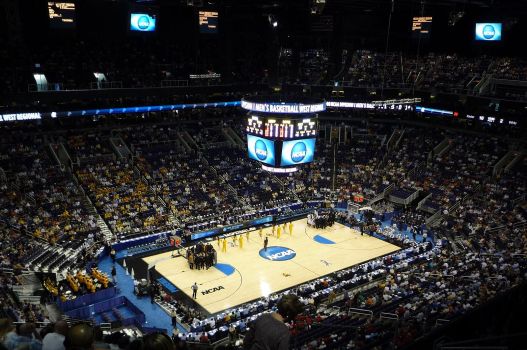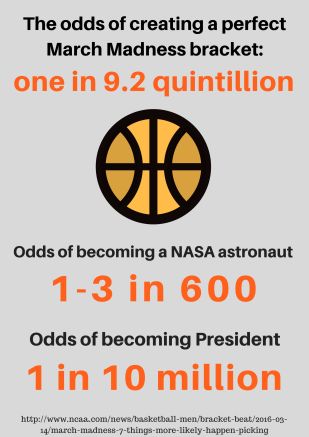It is March and sports fans know what that means: basketball. Participants are excited and have their brackets handy as they watch their picks win or lose. But where did this popular competition originate and what are the odds of creating a perfect bracket?
History and Tradition
March Madness originally began in Illinois. It started out as a state-wide high school basketball competition sponsored by the Illinois High School Association (IHSA) in 1908 and grew to over 900 schools in the late 1930s. It became so big by 1939 that it sold out the University of Illinois gym.
On March 27, 1939, University of Oregon won against The Ohio State University to become the first NCAA men’s basketball tournament champions.
The phrase “March Madness” came from Henry V. Porter, an executive from IHSA, who wrote about it in a letter entitled “March Madness.” The name stuck with the media and was officially trademarked by IHSA in 1989. The term was picked up by the NCAA in 1982.
For the first 12 years of the men’s tournament, only eight teams played. It grew steadily to the 68 teams we have today. The first NCAA women’s tournament was held in 1982.

Fans today love it for the fast-paced action and unpredictability of who is going to win.
“I love the spontaneity and the speed of it all. The match-ups are thrilling because it is rare to see a very competitive game between a number one seed and an unknown team. I love seeing the underdogs win or even just give the team a run for their money,” Anna Russo, sophomore sociology and criminology major with a minor in leadership, said. Russo has been following March Madness since high school.
Fans also love it for the few weeks of constant games and action.
“All day, every day is basketball” Sean Dailey, sophomore human resource major, said.
Brackets
To make a bracket, it is common for people to do research on the teams and players. Checking their statistics and how they’ve done in the past combined with a knowledge of basketball increases the odds of a team winning.
For Cabrini students there is a bias toward local teams, specifically Villanova. However, Villanova was recently eliminated from the competition after losing against Wisconsin.
“I am really sad that Nova got knocked out this early but their match-up was pretty tough for the second round. It was a hard-fought game but still disappointing,” Russo said.
However, there are other popular teams that students are rooting for.
“There is a bias toward North Carolina because they are always consistently good and I predicted them winning,” Kyisha Bright, junior criminology and philosophy major, said.
Betting and The Odds

“March Madness is complicated. If you’re going to do it be careful. Don’t bet too much money on it because you could lose a lot,” Dailey said.
It is estimated by the American Gaming Association that 70 million brackets will be filled out this year. The number of total bets is estimated at about $10.4 billion, up 13 percent from last year.
“To create a perfect bracket it’s like one in a billion, it’s next to impossible,” Dailey said.
The actual odds of creating the perfect bracket is one in 9.2 quintillion. It is incredibly unlikely but not impossible.
However a math professor from DePaul University argues that having knowledge of the sport increases the odds of winning to one in 128 billion.
If these numbers sound scary it will sound even worse comparing it to other statistics. There is a one in 50 chance of making a half-court shot at a basketball game, finding a four-leaf clover is one in 10,000 and winning an Academy Award is one in 11,500.
But the mind-blowing statistics do not deter participants because they see the fun in it.
“Overall I realize there is more to it than winning and my life is not in fact over,” Russo said.
The final four teams competing to win the championship are South Carolina, Oregon, North Carolina and Gonzaga. South Carolina will play Gonzaga and North Carolina will play against Oregon on Saturday, April 1. The National Championship will be held on Monday, April 3.
An intriguing number about these games comes from the experience of the coaches.
According to ESPN, Roy Williams, head coach of North Carolina, has coached 520 minutes in Final Four games. Mark Few, Frank Martin and Dana Altman, the coaches of the other three teams, post a combined total of zero minutes.


